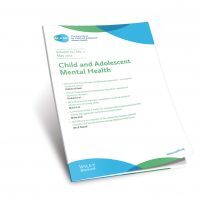Search results
-

Sexual Abuse in Children and Young People: Evidence-Based Approaches
This blog explores evidence-based approaches to prevent and intervene in cases of sexual abuse and harmful sexual behavior among children and young people.
Read more -
-

Chronotype and Depression in Adolescence
We know that there is a bidirectional association between sleep duration/quality and depressive symptoms in youth. In adult populations depressive symptoms and circadian rhythms (sleep chronotype) have also been linked. In this paper, we established an association between chronotype and depressive symptoms in middle adolescence, independently of poor sleep and prior mental health difficulties.
Read more -

Inclusion and Advocacy for Women with ADHD: Addressing Inequities and Challenging Diagnostic Bias on International Women’s Day
March 8th, 2024 is International Women’s Day and this year’s theme is “Inspire Inclusion.” Unfortunately, women who hold multiple intersecting identities that are systemically oppressed world-wide are often excluded from discussions. One example includes women who are neurodiverse, and more specifically for this post, women with attention-deficit/hyperactivity disorder (ADHD). Women and non-binary folks are often excluded from appropriate diagnosis of ADHD due to bias in providers, boy/men-dominated symptoms in the DSM-5 (Barkley, 2023; Hinshaw et al., 2021), socialization to mask and internalize symptoms, and sexism and other forms of discrimination. As with most discrimination, this is even worse for women with ADHD who also hold other systemically oppressed identities. This blog will focus on how to increase equity for women with ADHD with concrete solutions for multiples systems that affect them.
Read more -

Photovoice within Mental Health Research Involving Adolescents
Photovoice, a research method developed by Wang and Burris (1997), combines photography and narrative, and has emerged as a powerful tool for researching adolescent mental health for participants to express themselves visually, providing unique emotional and metaphorical insights less accessible to other traditional research methods.
Read more -

Call for papers – CAMH Special Issue 2025 ‘Physical Environmental Influences on the Psychosocial Outcomes of Children, Adolescents, and Young Adults’
The Child and Adolescent Mental Health (CAMH journal) invites manuscripts for a special issue entitled ‘Physical Environmental Influences on the Psychosocial Outcomes of Children, Adolescents, and Young Adults’ to be edited by Dr. Keri Wong, Dr. Steven Papachristou, and Dr. Marta Francesconi.
Read more -

The Role of Early Childhood Education in Supporting the Mental Health of Children
Professor Kathy Sylva OBE delivered this Keynote lecture ‘The Role of Early Childhood Education in Supporting the Mental Health of Children’ on Thursday 9 November at the ACAMH Awards. Professor Sylva was the recipient of ACAMH’s Michael Rutter Medal for Lifetime Contribution to Child and Adolescent Mental Health.
Read more -

Connecting the dots around unusual and distressing sensory experiences – recording for members
Free for members. This webinar and Q&A will looked at a range of projects to explore the breadth of lived experiences around unusual and distressing sensory experience to explore research priorities with young people, parents/carers, and important adults in their lives, such as teachers and mental health professionals.
Read more -

Moving Forward with ADHD (Attention-Deficit/Hyperactivity Disorder)
Celebrated every October, ADHD Awareness Month aims to educate the public about ADHD by disseminating information informed by evidence-based research. It provides an opportunity to correct misunderstandings, acknowledge lived experiences, and read the latest research from leading lights in the field.
This ADHD Awareness Month, we encourage you to explore the FREE learning opportunities available on our website, and to share with your networks.
Read more -

Redistributing power in schools and how this can impact young people’s agency and identity
Recent Guardian articles have been reporting how this year’s GCSE exam results have been impacted by the crisis in young people’s mental health. There is increasing concern among school leaders about school absence and abnormal levels of anxiety. As I embark on the third blog related to my research, I explore how the research processes I developed, positively impacted the young people involved and acts as a counter to much of what young people see as being wrong with schools.
Read more